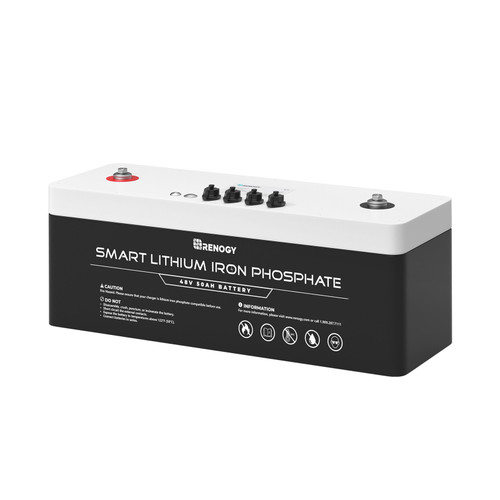-
save C$100.00

 Out of stock
Out of stock48V 50Ah Smart Lithium Iron Phosphate Battery
CAD $1,499.99 - CAD $2,799.99 CAD $1,599.99 -
save C$300.00

-
save C$500.00

-
save C$50.00

 Out of stock
Out of stockRover Boost 10A MPPT Solar Charge Controller 36V/48V
CAD $149.99CAD $199.99
Solar systems are no longer a thing of the future─they are an effective and efficient way to provide your home, RV, boat, or off-grid cabin with the energy they need. And as we continue to develop solar technology, we are finding new and innovative ways to improve upon the past.
For example, up until recently, 12V or 24V systems were commonplace, with 12-volt systems being the most popular. But now technology is allowing the use of 48V systems, so let’s learn more about them.
What is a 48V system?
Small setups like RVs or tiny homes can usually manage with a 12-volt or 24-volt system when it comes to power consumption. With these options, if you need more power, you can add more solar panels or another battery bank to increase your amp hours without too much hassle.
However, with larger homes, the solution may not be so simple, which is where 48-volt systems come into play. The more amps you need, the more resistance (and heat) you’ll produce. To prevent blown fuses, tripped breakers, or even worse, a fire, you need a system that can handle the increased capacity without increasing the hazards.
What are the advantages of a 48V over a 12V system?
- Higher Efficiency
For both off-grid solar systems and those connected to the grid, 48V systems provide full power for high voltage appliances that require many watts to run. With a 48V system, the configuration allows for a more direct energy path, reducing consumption. All you’ll have to worry about is configuring the wiring between the charge controller, battery, and inverter.
- Safety
Because 48V systems run at higher efficiency while using fewer amps, they can operate appliances more safely than lower voltage systems. A 48V system will not have to increase its amperage regularly to provide the same power level as a 12V or 24V system.
- Less Expensive Wiring and Batteries
48V systems don’t need to increase the current to appliances as frequently, which means they don’t need as much backup power from batteries. Also, they don’t require as much cabling and don’t need cables to be heat-resistant, making them cheaper.
- Scalable
Instead of taking a 12V system and scaling it up just to get to 48V, you can scale a 48V system even further. Right now, Renogy is developing a 48V LiFePo battery bank to support larger systems scalability.
Why is 48V the future of solar?
Each year, more and more devices become electrical or hybrid, and they will need solar systems to keep up. A 48V system can provide the energy these devices need without compromising on quality or design. Plus, 48V systems will work in vehicles that utilise 12V systems through developments with converters, all while not losing out on efficiency.
Renogy’s current projects create a 48-volt to 12-volt converter, so keep an eye out for that, along with the 48V LiFePo battery bank. Please note that we prioritise customer service and offer free shipping on orders over a specified price point.






